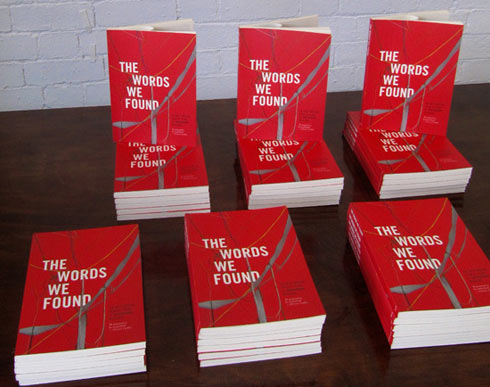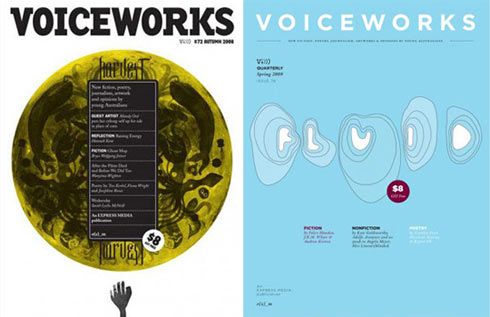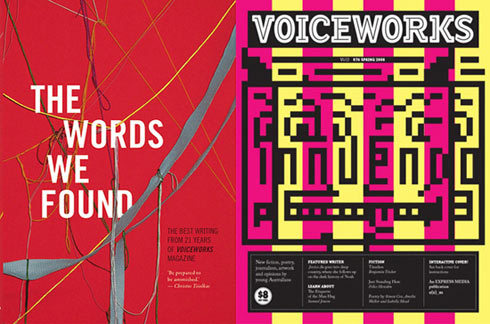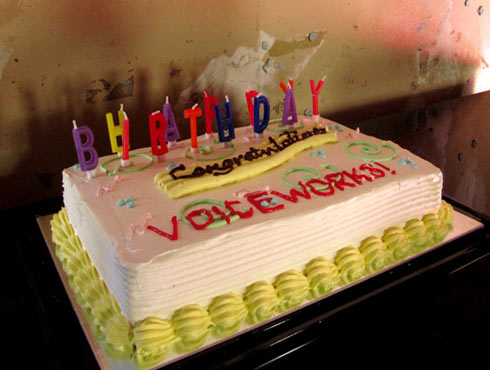The Words We Found



 Text: Belle Place Images: Voiceworks
Text: Belle Place Images: Voiceworks
It’s not often that a cast of some of the best contemporary Australian writers send words of congratulations on your birthday. Unless, that is, you are The Words We Found, an anthology of the best writing from twenty-one years of Voiceworks magazine. With a forward from Christos Tsiolkas (author of The Slap) and words from John Marsden, Voiceworks sheds its adolescence and rounds up some impressive alumni to help celebrate. Belle Place asks editor Lisa Dempster to reflect on who and what has shaped Voiceworks’ life so far, and like all good twenty first celebrations, share a couple of tales of optimism and awkward adolescent behaviour.
Based in Melbourne, Express Media has been publishing Voiceworks since 1988, starting out as a small, four to six page, unbound, black and white newsletter, largely Victoria focussed, which was mailed out to Express Media members. In the early 90s, Voiceworks grew into a national literary journal, bound and dressed up with a glossy, coloured cover, and expanding its content to include poetry, short fiction, articles, opinion and illustration.
Now all grown up, Voiceworks has a unique tone and style that is raw and unapologetic, and this is what Dempster reflects upon in the anthology. “Going through all the back issues of the magazine, I discovered so much good writing that I was really blown away. I also found that Voiceworks has quite a distinct style – the writing they publish is generally very brave and experimental. It’s powerful stuff, and I tried to choose pieces in this style for The Words We Found.”
At times, the writing is somewhat unrefined, but it is often poignant and witty, and unfailingly fierce and original. There’s a whiff of teen angst, but it seems to find its place in a publication which publishes young writers. On approaching past contributors Dempster sometimes heard an outright ‘no’, and many of the contributors took some persuading to let their work be published in the here and now. “One of the hurdles was that some people were embarrassed by the stuff they had written when they were much younger, and hesitant to allow me to republish it unedited. Like, I was asking Lili Wilkinson to publish something that she’d written when she was twelve, and Justin Heazlewood to publish an essay on impotence that he’d written as a teenager, that kind of thing. I guess it was kind of confronting.”
Moving away from more traditional formats of presenting content, Dempster chose to organise the anthology around themes, reflecting the way Voiceworks produces each quarterly issue around a different idea. The themes dovetail such a broad scope of writing, reining in over two decades of content. Sifting through twenty-one years of material was an immense task, but Dempster used this framework to help choose the contributors. “I was looking for writing that fit the themes that kept arising across the history of the magazine. I think the themes are universal not just to young people but writers in general – technology and the future, identity, sex and love, experimentation, politics and nationality. I organised The Words We Found according to these themes, rather than by chronology.”
Whilst no single editor seems to have left an indelible mark, under each captaining Voiceworks seems to have crept further onward, each editor pushing the journal forward and adapting it to their particular sway. “The influence of each editor is very obvious—Adam Ford was into poetry, Kelly Chandler was into creative non-fiction, and Tom Doig was just a bit mad and unrestrained. It’s fantastic that the magazine has nurtured their careers as well as those of its writers, and makes it an unpredictable journal—and that’s a good thing. I’m convinced it has managed to stay around for twenty-one years because it keeps having fresh life blown into it by its editors.” Many of these editors’ reflections are recorded in interviews and sectioned throughout the book. It is these interviews, sitting beside the work of the contributors, which illustrate all the sweat and tears, the pureness of doing something for the love of it, the dance-offs (apparently Voiceworks “wiped the floor with [Is Not magazine], three times in a row”), and most often, blind courage, that has led the to the making of this anthology.
These days Voiceworks is now a respected literary journal which belies the youth of its contributors. It may be written by young ones, but it is no longer geared only towards a wholly youth audience. Carrying the banner ‘New fiction, poetry, journalism, artworks and opinions by young Australians’, Voiceworks is a inimitable stomping ground for young writers making their first foray into publishing. Dempster also holds her own sense of optimism for the journal. “Voiceworks fills an essential role in [Australian] publishing, because it nurtures young talent. It has helped launch the careers of many writers over the years, and will continue to do so. Voiceworks pays its contributors, and many young people consider it their first professional publication. Plus the editors and editorial committee provide a lot of feedback to contributors, which of course helps to develop their skill at writing. I think in the future it will continue to launch young talent onto literary and political and artistic landscapes.”
The Words We Found is a true coming-of-age anthology, and perfect tribute to everything that has marked Voiceworks‘ life so far.
Voiceworks
Next Article: Rene Vaile – Things That Should Matter



